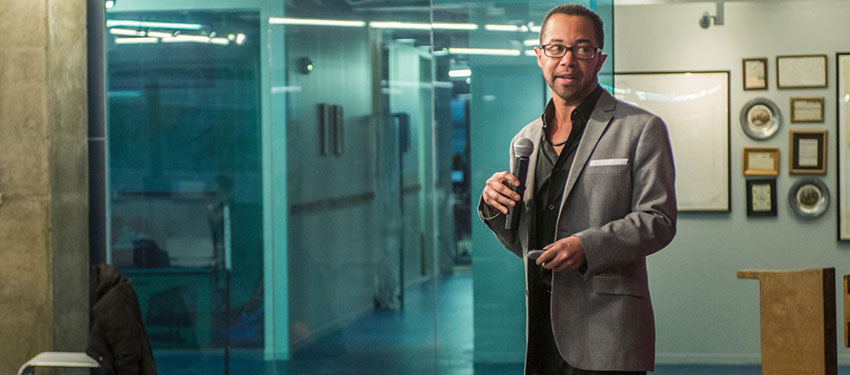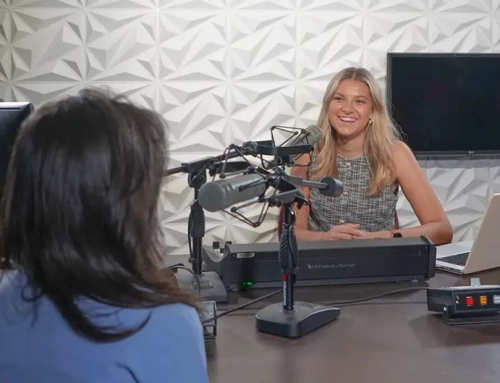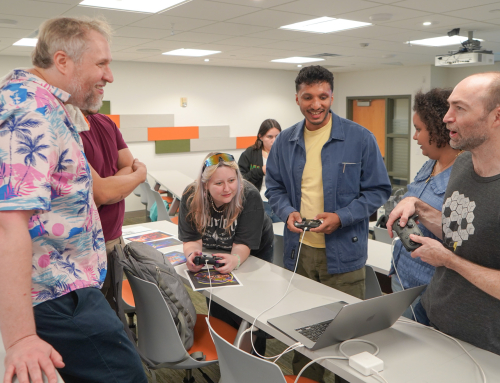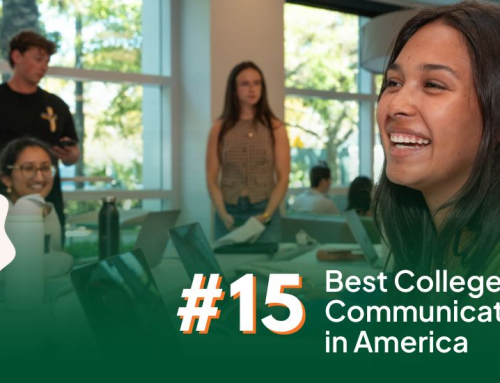By: Karina Valdes
When students think of studying journalism, the furthest thing from their minds is creating video games. Lindsay D. Grace is changing that at the University of Miami School of Communication through his groundbreaking work on news games, an innovative medium for journalists to engage readers and motivate them to become active in addressing the issues facing their community. Grace, an award-winning game designer, is returning this semester to UM as the Knight Chair of Interactive Media and will continue his work on rapid game development. He began his Visiting Knight Chair appointment at UM in the fall of 2017.
“As our Knight Chair in Interactive Media, Lindsay will assume a leadership role in educating students in cutting-edge areas that are increasingly important in journalism and other communication fields. He is a recognized leader in game design and will join our already talent-rich faculty in interactive media to ensure that we will have one of the very top programs of its kind in the country,” said Gregory J. Shepherd, dean for the University of Miami School of Communication.
The Knight Chair of Interactive Media position is an endowed chair funded the John S. and James L. Knight Foundation, which supports journalistic, artistic and community endeavors. It is part of a national network of Knight Chairs in journalism.
As part of his role, Grace is planning on developing engaging ways of educating the public on news quality and on assessing their perception of news. Through engagement with local arts, entertainment, and industry groups, Grace plans on increasing the presence and opportunities for local game making. While at the School of Communication, Grace is teaching two classes this semester: Introduction to Game Design and Advanced Systems: Designing Playful Experiences.
“I’m hoping to help students make new and novel social impact games on the issues that matter most to them,” said Grace.
He is also looking forward to establishing relationships with the community of Latin American game makers.
“Last year, I taught at the Escuela Internacional De Cine TV (EICTV) in Cuba, and I’d like to re-engage the community of Latin American game makers” said Grace. “I’m particularly interested in the ways in which we can share culture through play, how our understanding of a problem is framed through games, and how we impart unique stories through play,“ he added.
Another initiative Grace is working on is bringing Newsjam back to the School of Communication. Newsjam is a weekend-long game design event that took place at the School of Communication in Oct. 2017. The event brought together students and professionals from various backgrounds and disciplines to develop social impact games on current topics. The winning team prototyped an interactive game on climate change and rising seawater levels, and was flown to D.C to showcase the game and participate in the Game Design Thinking and the Newsroom Interactive Workshop at American University. Another Newsjam competitor received substantial financial backing on Kickstarter for his game.
“One of the participants of last year’s Newsjam at University of Miami was awarded $57,000 on Kickstarter for his game, Faeland. I’d like to encourage more such success among our students,” said Grace.
Students will also have the opportunity to work with Grace on his research.
“I’m also welcome to involving students in my own ongoing research into games and education. We are moving toward publishing our last 3 years of research with ETS on assessing argumentation skills, increasing STEM/STEAM field interest among women, cross cultural competence and sociopragmatics. The hope is that within the next decade some of these games will be substitutes for the standardized tests people to take today,” said Grace.
Grace is the vice president of the Global Game Jam(r) non-profit and the Higher Education Video Game Alliance, both focus on increasing access to game-making and education globally. He has received numerous awards and recognition from the Games for Change Festival, the Digital Diversity Network, the Association of Computing Machinery’s digital arts community, and Black Enterprise. He has shown his work internationally in Paris, Sao Paulo, Chicago, and other cities worldwide. He was also the founding director of the American University Game Lab and Studio.
Knight Foundation has endowed more than two dozen chairs at leading universities to help educate the next generation of journalists, encourage classroom innovation, foster new technology and techniques, and contribute thought leadership to academia and the news industry alike.







